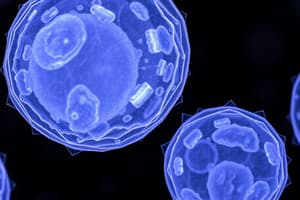Podcast
Questions and Answers
What is the primary function of the G1 phase in the cell cycle?
What is the primary function of the G1 phase in the cell cycle?
- Division of the cytoplasm.
- Synthesis of DNA.
- Condensation of chromatin.
- Cell growth and preparation for DNA replication. (correct)
Which phase directly follows the S phase in the cell cycle?
Which phase directly follows the S phase in the cell cycle?
- G2 phase (correct)
- G1 phase
- Cytokinesis
- Metaphase
What occurs during the anaphase of mitosis?
What occurs during the anaphase of mitosis?
- Sister chromatids are pulled apart to opposite poles. (correct)
- Chromatin condenses into visible chromosomes.
- Chromosomes align at the cell center.
- Nuclear envelope reforms around each set of chromosomes.
What is the role of checkpoints in the cell cycle?
What is the role of checkpoints in the cell cycle?
What is the significance of cytokinesis in the cell cycle?
What is the significance of cytokinesis in the cell cycle?
Flashcards are hidden until you start studying
Study Notes
Cycle De Vie De La Cellule
-
Définition: Le cycle de vie de la cellule est la série d'étapes par lesquelles une cellule passe, de sa formation à sa division.
-
Phases Principales:
-
Interphase:
- Phase la plus longue du cycle cellulaire.
- Comprend trois sous-phases:
- G1 (Gap 1): Croissance cellulaire, synthèse de protéines, préparation à la réplication de l'ADN.
- S (Synthesis): Réplication de l'ADN; chaque chromosome est dupliqué.
- G2 (Gap 2): Préparation finale pour la division cellulaire; vérifications et réparations de l'ADN.
-
Mitose:
- Processus de division cellulaire qui produit deux cellules filles identiques.
- Comprend quatre phases:
- Prophase: Condensation de l'ADN, formation du fuseau mitotique.
- Métaphase: Alignement des chromosomes au centre de la cellule.
- Anaphase: Séparation des chromatides sœurs vers les pôles opposés.
- Télophase: Reformation de l'enveloppe nucléaire autour des chromosomes à chaque pôle.
-
Cytokinèse:
- Division du cytoplasme, résultant en deux cellules filles distinctes.
- Se produit généralement en fin de mitose.
-
-
Importance:
- Assure la croissance, le développement et la réparation des tissus.
- Permet la reproduction asexuée chez certains organismes.
-
Régulation:
- Contrôle par des protéines régulatrices et des points de contrôle (G1, G2, M) pour garantir que le cycle cellulaire se déroule correctement et que les cellules ne se divisent pas de manière incontrôlée.
-
Anomalies:
- Des erreurs dans le cycle cellulaire peuvent mener à des maladies, y compris le cancer, dû à une division cellulaire non régulée.
Cell Cycle Overview
- The cell cycle comprises a sequence of stages through which a cell progresses from formation to division.
Main Phases
-
Interphase:
- The longest phase of the cell cycle, essential for cell growth and preparation for division.
- Contains three sub-phases:
- G1 (Gap 1): Involves cell growth and protein synthesis, preparing for DNA replication.
- S (Synthesis): Engaged in DNA replication, resulting in duplicated chromosomes.
- G2 (Gap 2): Final preparations for cell division; includes DNA checks and repairs.
-
Mitosis:
- A process of cell division that produces two genetically identical daughter cells.
- Comprises four stages:
- Prophase: Chromatin condenses into visible chromosomes; the mitotic spindle forms.
- Metaphase: Chromosomes align at the cell's equatorial plane.
- Anaphase: Sister chromatids are pulled apart to opposite poles of the cell.
- Telophase: Nuclear envelopes re-form around the separated chromatids at each pole.
-
Cytokinesis:
- The division of the cytoplasm, leading to the formation of two distinct daughter cells.
- Typically occurs at the end of mitosis.
Importance of the Cell Cycle
- Facilitates growth, development, and tissue repair in organisms.
- Enables asexual reproduction in certain species.
Regulation of the Cell Cycle
- Managed by regulatory proteins and checkpoints (G1, G2, M) to ensure orderly progression and prevent uncontrolled cell division.
Anomalies in the Cell Cycle
- Errors during the cell cycle can lead to diseases, particularly cancers, due to unregulated cell division.
Studying That Suits You
Use AI to generate personalized quizzes and flashcards to suit your learning preferences.




